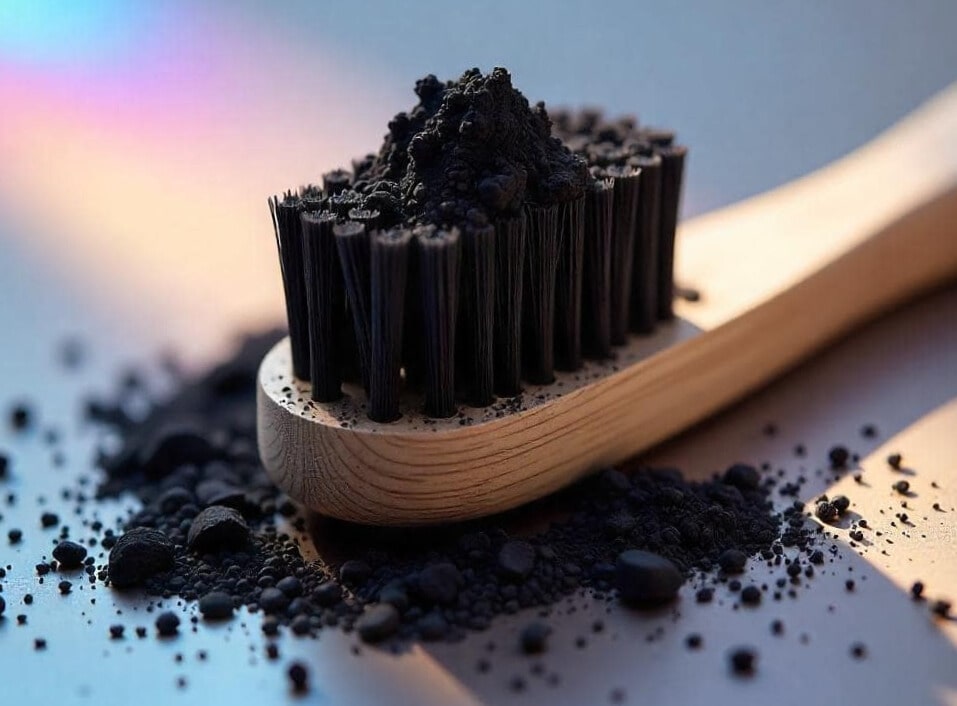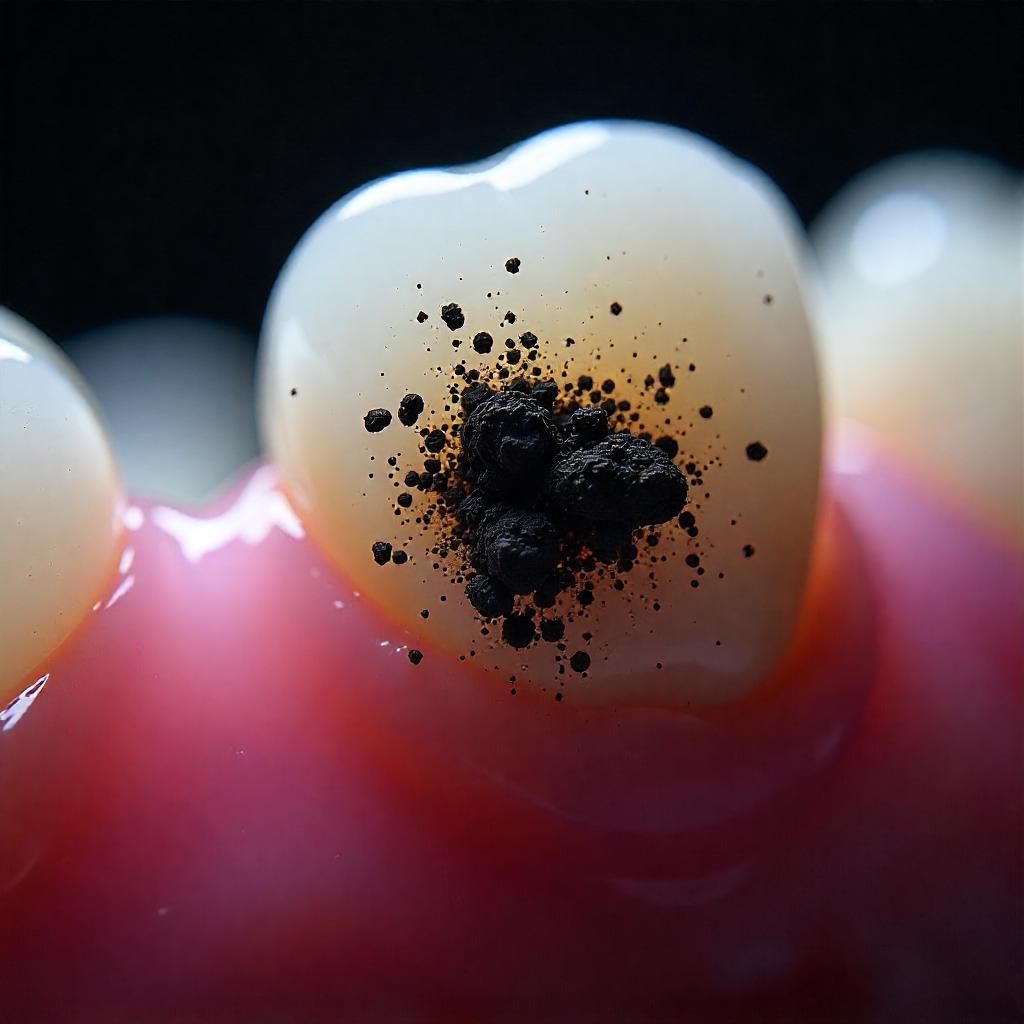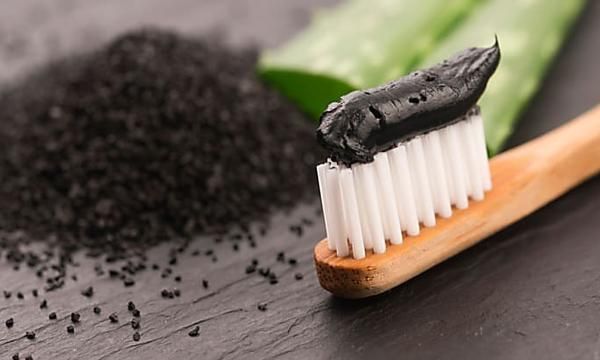Charcoal teeth whitening dangers are becoming a hot topic in dental care, especially as more patients turn to natural products for their oral hygiene routine. While charcoal toothpaste is marketed as a trendy, natural way to whiten teeth, dental professionals are increasingly concerned about its long-term effects on your smile.
At first glance, activated charcoal might seem like an appealing option. It’s natural, widely available, and endorsed by countless influencers. But does that mean it’s safe? In this post, we take a closer look at the real risks of activated charcoal teeth whitening, the science behind it, and safer alternatives for a healthier, brighter smile.
What Is Activated Charcoal, and Why Is It Used for Teeth Whitening?

Activated charcoal is a black, odorless powder made by heating carbon-rich materials such as wood, coconut shells, or peat to extreme temperatures. The result is a highly porous substance that’s commonly used in medical settings to absorb toxins.
In recent years, activated charcoal has found its way into skincare and oral care products, especially whitening toothpaste. Brands claim that its absorbent texture helps lift stains from coffee, red wine, and tobacco, promoting a whiter smile.
The concept behind activated charcoal teeth whitening is simple: the charcoal binds to surface stains and removes them as you brush. It sounds promising — but the science doesn’t fully support these claims.
Does Charcoal Teeth Whitening Actually Work?
While many users report short-term improvements in the colour of their teeth, these effects are typically due to surface stain removal — not true whitening. Unlike peroxide-based whitening treatments that penetrate the enamel to break down deep stains, charcoal only works on the outer layer of the teeth.
Furthermore, several studies have shown that charcoal toothpastes do not significantly change tooth color in the long term. According to a 2019 review in the British Dental Journal, there is little clinical evidence to support the whitening claims made by charcoal toothpaste brands.
So, what’s the real issue here? Let’s dive into the charcoal teeth whitening dangers you need to be aware of.
5 Risks of Activated Charcoal Teeth Whitening You Should Know

1. Enamel Erosion
The abrasive texture of charcoal can be too harsh for regular brushing. Many charcoal-based toothpastes are not tested for Relative Dentin Abrasivity (RDA) — a key measure of how rough a toothpaste is on enamel.
Over time, using abrasive charcoal toothpaste can wear down the protective enamel layer. Once that enamel is gone, it cannot regenerate. This can lead to:
-
Increased tooth sensitivity
-
Yellowing due to exposed dentin
-
Higher risk of cavities and decay
Among all the charcoal teeth whitening dangers, enamel erosion is one of the most serious and irreversible.
2. Gum Irritation and Soft Tissue Damage
Another hidden danger of charcoal teeth whitening is damage to your gums. The gritty particles can irritate soft tissue and even cause micro-tears in the gum line. If you already have sensitive gums or gingivitis, charcoal toothpaste can make it worse.
Some users report soreness or inflammation after switching to charcoal products — a clear sign that the product is too abrasive for daily use.
Learn more: Gum disease and its hidden impact on your teeth
3. Lack of Fluoride
Most charcoal toothpaste brands market themselves as “fluoride-free,” appealing to those seeking all-natural products. However, fluoride is essential for preventing cavities and remineralizing enamel.
By skipping fluoride, you leave your teeth more vulnerable to decay — especially if you’re already weakening your enamel with abrasive brushing.
4. Staining or Damaging Dental Restorations
Charcoal particles can cling to dental restorations such as:
Unlike natural enamel, these materials do not respond well to abrasive products. Instead of whitening them, charcoal may discolor or dull their appearance, creating an uneven smile.
5. Lack of Regulation and Long-Term Research
Despite their popularity, most charcoal whitening products are not approved by dental associations like the CDA or ADA. There is a serious lack of long-term research on how daily use of these products affects oral health.
Marketing claims like “detoxifying” and “natural whitening” are often unsubstantiated. Without clinical trials or regulatory oversight, it’s hard to trust what’s on the label.
What Do Dentists Say About Charcoal Teeth Whitening?
Leading dental associations, including the Canadian Dental Association (CDA) and the American Dental Association (ADA), have raised concerns about charcoal products. Their position is clear: the potential risks — especially enamel loss — outweigh any short-term cosmetic benefits.
Dental professionals emphasize that charcoal teeth whitening dangers are not just myths. The effects can be cumulative, especially when used daily without professional dental guidance. In most cases, your dentist in Vancouver will recommend avoiding charcoal toothpaste altogether in favour of safer, evidence-based options.
Are There Safer Ways to Whiten Your Teeth?
Absolutely. If you’re looking for a brighter smile without the risks, consider these dentist-recommended alternatives:
✅ Professional Teeth Whitening
Performed by your dentist, this method uses safe concentrations of peroxide to lighten deep stains from within the tooth. Results are faster, longer-lasting, and supervised for safety.
✅ Whitening Strips or Trays
Over-the-counter products with peroxide can be effective when used properly. Choose options with the ADA Seal of Acceptance for peace of mind.
✅ Whitening Toothpastes (Non-Charcoal)
These contain gentle abrasives and fluoride protection to remove surface stains while protecting your enamel.
✅ Regular Dental Cleanings
Tartar and plaque buildup can dull your smile. A professional cleaning every six months helps maintain a whiter, healthier mouth.
✅ Lifestyle Habits
Cut back on stain-causing foods and drinks like coffee, wine, and soda. Brush twice daily, floss, and rinse with water after meals to keep your smile bright.
Final Thoughts: Is Charcoal Teeth Whitening Worth the Risk?
Although charcoal toothpaste may seem like a trendy solution, it often delivers minimal results at the cost of long-term oral health. The dangers of charcoal teeth whitening — from enamel erosion to gum damage — make it a risky choice, especially when safer whitening solutions are available.
Before using any whitening product, especially one marketed as “natural,” it’s essential to consult with your dentist. What works for one person could damage another’s enamel or restorations.
Let Arbutus Dental Clinic Help You Whiten Safely
If you’re concerned about stained or discoloured teeth, don’t leave your smile in the hands of untested products. At Arbutus North Dental in Vancouver, we offer safe, effective, and personalized whitening solutions that protect your enamel and give you real results.
🦷 Book your consultation today and discover a brighter, healthier smile — without the risks of charcoal teeth whitening.
